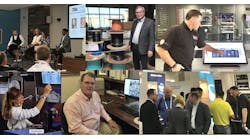Latest from Professional Development/Leadership
I have found that creative-thinkers and innovators have a variety of habits in common. In fact, I refer to this pattern of practices as the Innovator’s Lifestyle.
There is a combination of aspects that coalesce into what we know as an innovator, and those are Technique, Mindset, and Lifestyle.
Technique, however, is probably the least of it, because once an innovator masters the technique it comes as second nature. I don’t mean to disparage this skill or ability because mastering it is key to being an innovator, and it isn’t easy. The technique is stimulating creativity on demand. There are many variations of how you can go about doing this, but they all boil down to changing your perspective, that is, seeing and thinking of things in different ways.
The second aspect of the innovator, is Mindset which is a collection of traits that begins with the belief that they are creative. It is this powerful self-efficacy that enables the innovator to continue to pursue creative endeavors despite rising risks and mounting failures. They simply believe that they will eventually succeed. As Thomas Edison once famously declared, “I have not failed; I’ve just found 1000 ways that won’t work.” Which brings me to another key characteristic of mindset: innovators are willing to take risks that others are not. They regularly break rules and abandon the traditional ways of doing things.
Perhaps the most important aspect of being an innovator is Lifestyle. But, before I explain the habits and behaviors that define the Innovator’s Lifestyle, we should first consider what an IDEA is, because innovators conceive and implement ideas. It is important to understand that most ideas are not born anew, but instead are combinations of existing concepts. It’s the connecting of 2 or more products, methods, notions, or principles, and then synthesizing those into something new that makes an idea.
The primary habit of the Innovator’s Lifestyle is to be routinely exposed to different viewpoints and new stimuli. Creative-thinkers and inventors seek out new information and attempt to experience as many new things as possible. The reason for this is because the more diverse data you have in your brain, then the more material you have for making new connections and combinations.
The second most common inclination of innovators is to question authority or the status quo. In other words, they ask Why do we do things this way? and Is there a better way to do this? Those 2questions are the beginning of changing your perspective, and of seeing and thinking of things in a different or new way. Related to this is having a strong sense of curiosity.
A third tendency is that they unconsciously, and often compulsively, look to create new connections, make new combinations, or find new ways of doing things.
Curious to see how my idea of the Innovator’s Lifestyle jived with others, I conducted an informal poll of innovators, asking this question As an innovator, what habits do you have (daily or otherwise) which you believe enhance your creative-thinking ability and make you a better innovator?
Here are some of their responses:
Tim Stroh, an innovator in Melbourne, Australia, replied, "Read from a diversity of sources on a diversity of subjects."
Rachel Audigé, an innovator in Melbourne, Australia, replied, "Look for patterns."
Kyle Nicholas McCray, an innovator in Sacramento, California, shared this quote from Steve Jobs, "Don’t be trapped by dogma — which is living with the results of other people’s thinking. And most important, have the courage to follow your heart and intuition."
Derek White, an innovator in London, replied, "I found an essential habit is to think out loud with others and not be afraid of appearing stupid. Your stupid questions may give them ideas or prompt them to question their own assumptions/thinking."
Venice Blue, a creative strategist in San Francisco, replied, "Daily meditation practice. An invaluable foundation for the work of innovation, creative problem-solving, and empathy."
Jean Christophe Denis, an innovator in Grenoble, Rhône-Alpes, France, noted that Nikola Tesla would walk an hour every day as it helped him put his ideas together and form new solutions.
Robin Danielson, an innovator in Davenport, Iowa, replied, "I’m constantly looking for new inspiration, I study my customers businesses, and keep an open mind."
Robert Peacock, an entrepreneur in Vancouver, British Columbia, Canada, replied, "Journal, journal, journal!! I have made it a habit to journal my thoughts, favourite readings, reflections from conversations, etc. on a regular basis (often daily) and my journals are a resource that I go back to again and again when I need inspiration."
Cate Brady, a serial entrepreneur in Chicago, replied, "Spending time looking at art and listening to music."
Cliff Spiro, an innovation coach in Savannah, Georgia, replied, "It is important to vociferously read an eclectic suite well afar from your field or industry."
Roger Brown, a serial inventor in North Augusta, South Carolina, replied, "Every day I pick a random topic/subject to think on different from whatever I am currently working on."
Jon Thorne, co-Founder of My Innovation Space in St Albans, United Kingdom, replied, "When things are not going my way, I will try to ask myself What have I missed?
Jean-Dominique Cretin, an advanced product design engineer in Barcelona, Spain replied, "I leave the subject aside and move on to another problem. This is the incubation period."
Leonardo Comparsi de Oliveira, a corporate innovation executive in Porto Alegre, Brazil, replied, "Actively listen to people, suspend judgement."
Mohammad Al-Baroudi, an innovation consultant in Saudi Arabia, replied, "I love puzzle games."
Adam Bostock, an innovation trainer in Mansfield, Nottinghamshire, United Kingdom, replied, "Research, research, research (every day if you can, or weekly)."
Océane Dorange, an innovation facilitator in Tilburg, Netherlands, replied, "I walk outside, I empty my agenda, I get inspired by art, I draw, I take notes, I take time to reflect, I don’t judge the ideas I have."
Zayna Khayat, a future strategist in Toronto, Canada, replied, "Read. A lot. Especially from unusual sources well outside my industry."
Risa Stein, PhD, Director, Rockhurst University Innovation Academy in Kansas City, Missouri, replied, "I try to keep my ego and insecurity in check enough to remain open and receptive to others."
Innovation and creative-thinking are all about solving problems or satisfying needs. At work we use terms like “putting out fires” when we’re referring to sudden problems that need immediate resolution. We refer to people who are good at this as “Trouble Shooters” but what we really mean is that they are creative-thinkers and creative leaders."
The fact of the matter is that we are all called upon to use our creative-thinking every day in many little ways. It happens so often we don’t even realize we’re doing it. Think about it this way: if you had to re-invent all the little short cuts you take every morning as you go through your routine of getting ready for work, you’d never make it out of the house. People don’t realize how often they create tiny little improvements or efficiencies in all the tasks they do. We are constantly figuring out slightly better ways of doing things — especially things we do on a regular basis — which makes all of us innovators at heart.





